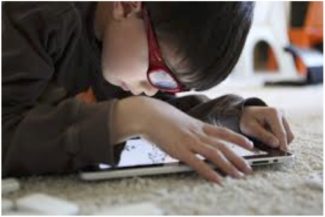 I recently viewed the documentary “Screenagers” by Dr. Delaney Rustun at Running River School (1370 Park Circle, Lafayette CO) and participated in a group discussion afterwards.
I recently viewed the documentary “Screenagers” by Dr. Delaney Rustun at Running River School (1370 Park Circle, Lafayette CO) and participated in a group discussion afterwards.
If you haven’t seen this documentary, I highly recommend it!
(To find a location for a screening go to Screenagersmovie.com and click on “Find a Screening”. There are a number of screenings listed for the Denver/Boulder/Ft Collins area)
The film is a comprehensive review of the current research on screen time’s effects on teens in particular, as seen through a parenting lens. Dr Delaney Rustun, concerned and unsure of how to best handle her own teenagers’ screen time use, delved into the topic and the available research and created a fascinating documentary.
The audience discussion after the documentary was also very impactful because many kids – young or in their teens – shared how the film had affected them: “I didn’t know someone could stay up for 18 hours or longer playing video games!”
“Sometimes I get bored for about 30 seconds and I don’t know what to do, so I start playing on the computer. After seeing this, I’m going to try to get outside more now”.
While the film takes a good look at this issue and offers lots of positive suggestions for implementing change at home (as does the resource page on the Screenagers website) I wanted to mention another problem with screen time that doesn’t get covered in the documentary.
This is the deeper bodily and energetic effect that screen time has on all of us.
One of the primary effects that screen time has on the human nervous system is that it creates a mind body split – especially in young children whose nervous systems are still developing. As we all know, there is an intimate connection between the body and the brain. The body sends info up to the brain, and the brain sends info back to the body. When this connection is disrupted, dysregulated, or somehow compromised, we are not as capable of feeling, being impacted by, or assimilating our experiences, or of learning about our internal and external worlds as fully as we might.
When we sit down in front of a screen, energy immediately rises to the head as the screen is providing a very powerful visual and mental stimulus, regardless of what we are watching.
As energy rises to the head, our attention becomes fixated on the screen and identification with what we are watching on the screen increases. This cuts off our AWARENESS of our body sensations as well as the feelings and sensations arising from the heart and gut “brains”. This means that we’re still having sensations and feelings, but we’re generally not aware of them during screen time use.
As Lao Tzu said 2600 year ago:
“The ears of someone whose eyes are examining the tip of a fine hair do not hear a peal of thunder; the eyes of someone whose ears are tuning a musical instrument do not see an enormous mountain. Thus when there is a fixation of attention on small things, then there is forgetfulness of great things”
Being aware of our body sensations, feelings, thoughts and impulses is called body sensing, or having a “felt sense”. This is already a compromised skill in our culture and it becomes weaker the more we are on the screen unless we do other practices or exercises to reinstate it.
Without the ability to body sense we are cut off from our access to our deep bodily wisdom and knowledge.
Moderate screen time is ok because the body can reset it itself, but spending too frequent or prolonged amounts of time with energy and attention going primarily to the brain only, then the ability to body sense becomes very compromised. This is especially true in young children in which the brain/body circuit is still developing.
As Dr Dan Siegel states, “Where attention goes, information flows and neural firing grows”.
The whole process of being on the screen and having all that energy rush to the brain creates the syndrome of “being in your head”, which is a colloquialism, but aptly describes how the majority of people live.
When you’re “in your head”, you aren’t grounded or centered, and you don’t have access to the full impact and range of your experience and what you are learning from it.
When this mind/body split happens early on, kids are set up to have a lot of problems later – like the baby mice in the movie that were unable to recoup their ability to learn as quickly as other mice after being exposed to the lights, sounds and stimulation that comes from being on a screen.
Evolutionarily, we are still set up to learn most reliably through our body and through our experience. Which is why experiential learning is so much more powerful than just learning facts and information. When one is not centered and grounded in the body, it makes it much harder to learn. One doesn’t have one’s full capacities “on line” so to speak. And it makes it harder to distinguish between facts/info and knowledge and wisdom. We start mistaking information for wisdom, which compromises our ability to do most everything well. True wisdom is fully embodied and grounded in experience.
So what can you do to learn how to body sense screen time’s effect on you?
Because screens are so stimulating, in my practice I often talk with kids and parents about how screen time is like “brain candy”.
It’s fun and stimulating to play a video game, to buzz around on the web looking up this and that. We get that quick hit, that dopamine rush, but it’s not real nourishment. Like candy it tastes good and it feels good – temporarily. Then there’s some kind of crash (large or small) when the hit is gone and the nervous system has to reset itself. Which leaves one craving another hit. Because it’s not deeply nourishing we continue wanting “one more hit” or “one more taste”, “just one more game, mom”. And like candy, some people are more susceptible to abusing this cycle than others.
Some people can eat one piece of chocolate, candy or other sweet treat and walk away. Other people can’t. It’s the same with screens. Some people can get on and off the screen easily, and not feel that “sucked in”. Others really struggle with this. This is especially true of kids.
Parents need to observe these phenomena in themselves and help their children begin to observe it themselves as well. The keys to finding out how you and your children are affected, is to learn to body sense and ask yourself the following questions and/or observe them in your child or teen:
- How does my body feel when I’ve been on the screen for 30 minutes, 1 hour, 8 hours; right before bed; first thing in the morning?
- How does my back feel, my shoulders, my hips and calves; are my muscles tense or relaxed?
- What’s my heart rate like; am I breathing easily or holding my breath?
- How do my eyes feel, are they relaxed or straining and irritated?
- Are my thoughts cloudy or clear; how is my ability to focus; am I spaced out?
- What is my mood: am I irritable or calm, where is my energy located in my body; can I fall asleep easily?
Most kids can recognize when they’ve gone over their body’s screen limit based on how they feel – IF you help them tune into it. However, because of the intensity of the screen’s stimulation, kids and adults are constantly overriding these messages from the body and continuing on the screen long past the time the body says, “enough!”
**Here’s an experiment that families can do together:
- Spend 10 or 15 min getting really relaxed – lay down on the floor and let your whole body sink into the floor while breathing into your belly and relaxing your muscles. Notice when your muscles start to release and your breathing changes and really drops into your belly. Notice any other changes that have occurred during this relaxation period. Use the above questions to guide your awareness.
- After relaxing, spend 10-15 min on the device of your choice. Use your screen the way you normally would – text, surf, watch YouTube, shop or whatever.
- After 10-15 min put your device down and close your eyes. Body sense as many sensations in your body as you can, using the list above list as guide. Observe any differences in your body between the before and after periods.
- Repeat the experiment as many times as you’d like to get a clear sense of what is happening in your body before and after screen time. You can alter the experiment by relaxing and being on the screen for longer and short time periods, different times of the day, etc.
These observations will point out where your struggles with screen time lie and the effects that it is having on your physical, emotional, and mental states. From there you’ll be able to make positive adjustments to help your family.
For the best up to date and comprehensive review of screen time and all its’ physical, emotional and cognitive effects, read:
“Reset Your Child’s Brain”, by Victoria Dunckley, MD.
Dr. Dunckley also has a very informative website at www.resetyourchildsbrain.com
Good luck and conscious screening!

